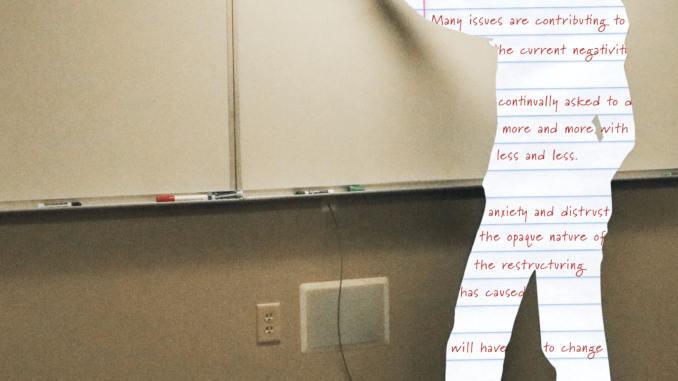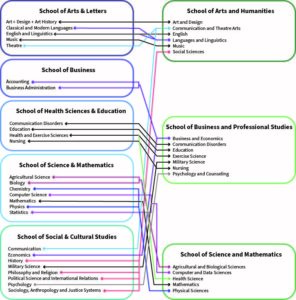

Truman State University professors recently participated in the periodic American Association of University Professors survey. The purpose of the survey is to collect faculty feedback and opinions on a number of distinct topics.
This year, the topics included: reorganization, technology issues, chair selection policy and overall campus climate. The results reveal a drastic drop in faculty morale as compared to years prior and a general distrust and lack of communication between faculty and administration.
Section One of the survey focused on the reorganization of departments into three schools following our current five school system.
About two years before Provost Freedman joined the administration, a reorganization committee made up of Truman faculty created multiple plans for the distribution of departments among the three schools. They had deliberately focused the plans on creating a system wherein every department would not be negatively affected and professors felt satisfied.
According to faculty senate president, Kathryn Brammall, the new organization of majors into three schools does not reflect any of the plans faculty agreed to before current provost, Eric Freedman joined the administration.
“There are some elements about it that are very concerning to some faculty. The history department is on record, we do not like this model. We don’t have a problem with the three school model. We don’t like the department configuration we’ve been put into,” Brammall said.
Brammall acknowledges some of the negative responses in the survey by saying, “To suggest that Truman has been a perfectly collegial environment until this [reorganization] happened, I think is a misrepresentation of the past and of Truman’s history.”
Mathematics department chair David Garth said his department will not experience a negative or positive outcome from the reorganization.
“I think everything will stay pretty similar to what we have already experienced,” Garth said. “We’ll stay in the same school – science and mathematics – so I don’t have any worries right now.”
While science, technology, engineering and math departments are generally content with the state of the new schools, the social sciences have many concerns regarding the new organization. According to the new academic model, the social sciences will fall under arts and humanities.
Meg Edwards, assistant professor of political science and international relations, has expressed that communication between administration and faculty has not been very productive.
“I think they’re willing to hear our concerns — I haven’t witnessed a lot of willingness to accept our opinions and our feedback and take them into account,” Edwards said.
Under the new organization, the School of Social Sciences will consist of a wide range of departments including: anthropology, criminal justice, history, philosophy and religion, political science and international relations and sociology. This group is being referred to as the “mega department” by a number of faculty, and it raises concerns among professors.
“I have expressed concerns that I am a political scientist. That’s where my background is. I have a PhD in political science. I would consider that to be part of the social sciences, but I don’t feel like the social sciences would fall under the arts and humanities. For me, the social sciences would fall under the sciences,” Edwards said.
There are departments in the social sciences that numerous professors agree should not be categorized as a social science. History and philosophy and religion study things in very different ways than political science and international relations do.
Many professors find the social sciences to be a strange grouping of departments, but Elizabeth Wiles, assistant professor of criminal justice studies, thinks the reorganization could bring new opportunities to her classes.
“Criminal justice studies is already in an administrative unit with anthropology and sociology, and I feel really positive since I’ve restructured the major, so it could be a good thing interdisciplinarily,” Wiles said.
Wiles thinks one of the things that makes Truman wonderful and unique is the small scale on which everything exists. Wiles said, “My department chair knows me, knows my classes.” Her concern lies within losing that connection within such a large department. Overall she is hopeful that the organization could bring together complimentary departments.
Randy Hagerty, political science and international relations department chair, was not surprised when reading the negative replies in the response section of the AAUP survey.
“Just talking to people in the hallway and around campus, I’ve seen a lot of unhappiness with the way the reorganization was handled. We had a committee that put significant work into putting together four models that the reorganization would follow. There were extensive consultations with the faculty of every department.”
Hagerty said the committee conducted one-on-one meetings with the entire department with plenty of opportunities to give feedback.
Hagerty thinks the frustrations coming from those who spent large amounts of time building this plan are valid in their feelings.
According to Hagerty, there was a strategic planning and assessment workshop just before the fall semester began, and it was at that workshop Provost Freedman presented the plan for the reorganization.
“A lot of us were shocked because there was absolutely no indication that this was coming down the road. Despite assertions by some of the administration to the contrary, we were not asked for nor did we have an opportunity to present feedback on what we thought about these models,” Hagerty said.
There was an alternative plan made by the chairs of the departments in the new social sciences sector which would have split the majors into groups that the faculty members thought would work better. “That was rejected,” Hagerty said.
Hagerty emphasized the fact that professors were never opposed to reorganization, and they recognized it was necessary following declining enrollment. However, many faculty members feel unseen and unheard following the decisions and actions made by Provost Freedman. Freedman declined to comment on the reorganization plan or the AAUP survey.
“We aren’t opposed to reorganization. We’re opposed to this reorganization,” Hagerty said.
